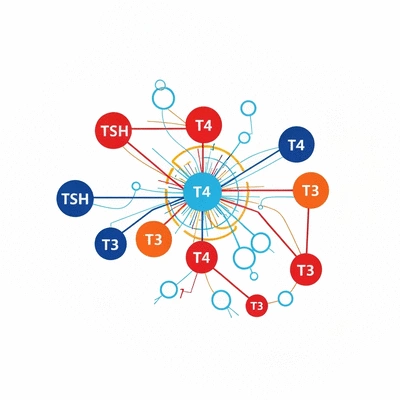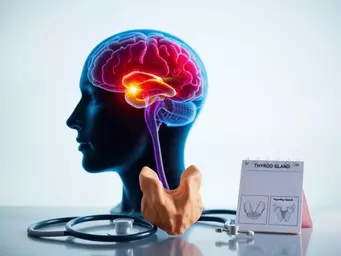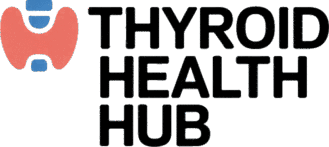Understanding Your Thyroid Lab Results

Understanding your thyroid health can feel overwhelming, but it doesn't have to be. By recognizing the significance of TSH, T4, and T3 hormones, you can start to decode your body’s signals and take charge of your well-being. This knowledge isn’t just for healthcare providers; it’s a tool for you to advocate for your health effectively.
What You Will Learn
- TSH signals the thyroid to produce T4 and T3, essential for regulating metabolism.
- T4 is the primary hormone released by the thyroid, while T3 is the more active form impacting bodily functions.
- The interplay between TSH, T4, and T3 is crucial; an imbalance can cause conditions like hypothyroidism or hyperthyroidism.
- Regular monitoring of thyroid hormone levels is vital for managing your thyroid health effectively.
- Understanding lab results, including the significance of free vs. total hormones, helps in making informed health decisions.
The Core of Thyroid Health: TSH, T4, and T3 Relationship
This visual illustrates the interconnected roles of Thyroid Stimulating Hormone (TSH), Thyroxine (T4), and Triiodothyronine (T3) in regulating metabolism.
TSH (Thyroid Stimulating Hormone)
Origin: Pituitary Gland
Function: Signals thyroid to produce T4 & T3.
T4 (Thyroxine)
Origin: Thyroid Gland
Output: ~90% of thyroid's hormone production.
T3 (Triiodothyronine)
Origin: Converted from T4
Function: Active form, regulates metabolism & energy.
Feedback Loop & Imbalance
Low T4: ↑ TSH (Stimulation)
High T4/T3: ↓ TSH (Inhibition)
Understanding Thyroid Function: The Role of TSH, T4, and T3
Understanding how your thyroid functions is crucial for managing your health, especially if you're dealing with conditions like hypothyroidism. The thyroid gland plays a pivotal role in regulating metabolism, energy levels, and even mood. Key players in this process are hormones known as TSH, T4, and T3. Each of these hormones works together to ensure your body runs smoothly, so let’s break them down to see how they interact.
What Are TSH, T4, and T3? A Brief Overview
TSH, or Thyroid Stimulating Hormone, is produced by the pituitary gland and signals the thyroid to produce T4 and T3 hormones. T4 (thyroxine) is the primary hormone produced by the thyroid, accounting for about 90% of its output, while T3 (triiodothyronine) is the more active form that affects various bodily functions. Understanding these hormones is essential for recognizing how they influence your health.
- TSH: Signals the thyroid to produce hormones.
- T4: The main hormone secreted by the thyroid; often converted to T3 in the body.
- T3: The active hormone that regulates metabolism and energy levels.

These hormones are not just numbers on a lab report; they tell a story about your thyroid's health! If you're ever confused about your lab results, don’t hesitate to reach out. We're here at Thyroid Health Hub to help you decode that information.
The Thyroid Gland: How It Regulates Metabolism
Located in the front of your neck, the thyroid gland is shaped like a butterfly and is responsible for producing hormones that regulate your body’s metabolism. The amount of T4 and T3 in your bloodstream influences how quickly your body converts food into energy, impacting everything from weight to mood. If your thyroid is underactive, known as hypothyroidism, you may experience fatigue, weight gain, and cold intolerance.
- Increased energy levels with balanced hormone levels.
- Healthy weight management when metabolism is functioning optimally.
- Improved mood stability when thyroid hormones are within the normal range.
It’s fascinating how these hormones can affect so many aspects of our health! Recognizing the signs and symptoms of an imbalance can empower you to take action.
Thyroid Hormone Regulation: The Interplay Between TSH, T4, and T3
The relationship between TSH, T4, and T3 is a delicate balance. When T4 levels are low, the pituitary gland releases more TSH to stimulate the thyroid. Conversely, if T4 and T3 levels are high, TSH production decreases. This feedback loop is essential for maintaining hormonal balance. If one hormone is out of whack, it can lead to a cascade of health issues. For more detailed information on this intricate process and what various thyroid function tests measure, you can refer to resources like the British Thyroid Foundation.
- Feedback Loop: TSH stimulates T4 production, which is then converted into T3.
- Impact of Imbalance: An imbalance can lead to conditions such as hypothyroidism or hyperthyroidism.
- Importance of Regular Testing: Monitoring these hormones is crucial for effective management of thyroid health.
By understanding the roles of these hormones, you can better appreciate your body’s signals and advocate for your health. Stay informed and proactive—knowledge is power, especially when it comes to thyroid health!
Pro Tip
To maintain optimal thyroid health, consider incorporating iodine-rich foods, such as fish and dairy, into your diet. Additionally, regular exercise can help regulate the hormonal balance of TSH, T4, and T3, enhancing your overall well-being.
Frequently Asked Questions (FAQs) About Thyroid Health and Lab Tests
Here are some common questions to help you better understand thyroid health and the significance of TSH, T4, and T3 levels:
- Q: What is the primary role of TSH?
- A: TSH (Thyroid Stimulating Hormone) is produced by the pituitary gland and primarily signals the thyroid gland to produce and release thyroid hormones (T4 and T3).
- Q: What is the difference between T4 and T3?
- A: T4 (thyroxine) is the main hormone produced by the thyroid gland, acting as a storage form. T3 (triiodothyronine) is the more active form of the hormone, largely converted from T4 in other tissues, and is responsible for regulating metabolism and energy levels.
- Q: How do TSH, T4, and T3 interact in the body?
- A: They form a feedback loop. When T4 and T3 levels are low, the pituitary gland releases more TSH to stimulate the thyroid. When T4 and T3 levels are high, TSH production decreases to inhibit the thyroid. This balance is crucial for metabolic regulation.
- Q: What does it mean if my TSH is high or low?
- A: High TSH typically indicates hypothyroidism (underactive thyroid), meaning the pituitary gland is working harder to stimulate a sluggish thyroid. Low TSH often suggests hyperthyroidism (overactive thyroid), where the thyroid is producing too much hormone, causing the pituitary to reduce TSH production.
- Q: Why is regular monitoring of thyroid hormone levels important?
- A: Regular monitoring is essential for managing thyroid conditions like hypothyroidism or hyperthyroidism, ensuring treatment effectiveness, and preventing complications. It helps maintain the delicate hormonal balance required for overall well-being.
Conclusion: Taking Charge of Your Thyroid Health
As we wrap up our discussion on thyroid lab results, it’s essential to remember that understanding these tests is a crucial step in managing your thyroid health. By grasping the roles of TSH, T4, and T3, you can better advocate for yourself in healthcare settings. My goal at Thyroid Health Hub is to empower you with the knowledge to take charge of your health journey!
Here are some key takeaways to keep in mind:
- Understanding the normal ranges for TSH, T4, and T3 is fundamental.
- Abnormal results can indicate various conditions, from hypothyroidism to hyperthyroidism.
- Comprehensive testing, including antibody tests, can provide a clearer picture of your thyroid health.
Key Takeaways for Understanding Thyroid Lab Results
When you receive your thyroid lab results, it’s important to contextualize them within the broader picture of your health. Each level has implications that can lead to different management strategies. For instance, if you have elevated TSH levels, it's often a sign of hypothyroidism, indicating that your thyroid is underactive. How does this resonate with what you’ve been experiencing?
Conversely, low TSH might suggest hyperthyroidism, where your thyroid is overactive. Remember, these interpretations should always be discussed with a healthcare provider. Here are the main points to consider:
- Review the reference ranges for TSH, Free T4, and Free T3 levels.
- Understand the significance of total vs. free hormones in your results.
- Recognize the importance of follow-up tests to monitor your condition effectively.

Next Steps: Empowering Yourself with Knowledge on Thyroid Conditions
Taking charge of your thyroid health involves active participation in your care. After interpreting your lab results, it's vital to consider what comes next. Engage with your healthcare provider about your findings and any symptoms you may be experiencing. Have you thought about what questions you want to ask during your next appointment?
Moreover, educating yourself further can be incredibly beneficial. Resources like Thyroid Health Hub offer comprehensive materials to help you navigate your journey. Here are some next steps you might consider:
- Set clear goals for your health with your doctor.
- Research dietary and lifestyle changes that can support thyroid health.
- Connect with support groups to share experiences and gain insights.
Common Misconceptions and Clarifications Regarding Thyroid Health
Many people have questions and misconceptions about thyroid health. It's common to wonder why lab tests are necessary or how often they should be done. For instance, some may believe that once they start treatment, they don’t need to continue monitoring their thyroid levels. However, regular check-ups are essential for effective management.
Other common misconceptions include the belief that low TSH always means hypothyroidism, or that once diagnosed, there’s nothing more to understand about the condition. In reality, thyroid health is multifaceted, and ongoing education is key!
Resources for Further Information on Thyroid Health: Organizations and Support Groups
Empowering yourself means knowing where to find reliable information. At Thyroid Health Hub, we provide a range of educational materials, but there are also excellent organizations and support groups out there. Here’s a list of resources you might find helpful:
- American Thyroid Association (ATA) - A leading organization offering guidelines and research on thyroid health.
- Thyroid Cancer Survivors’ Association (ThyCa) - An invaluable support network for those dealing with thyroid cancer.
- Local support groups - Look for community-based thyroid support groups where you can share experiences and gain insights from others facing similar challenges.
By utilizing these resources, you empower yourself to understand and manage your thyroid health better!
Recap of Key Points
Here is a quick recap of the important points discussed in the article:
- Understanding TSH, T4, and T3 is essential for managing thyroid health.
- TSH stimulates the production of T4, which is converted to the active hormone T3.
- Regular monitoring of thyroid hormone levels is crucial for effective management.
- Imbalances can lead to conditions such as hypothyroidism or hyperthyroidism.
- Engaging with healthcare providers and utilizing educational resources can empower individuals in their health journey.









